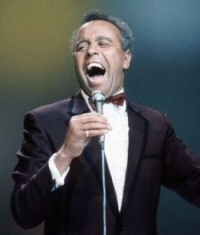Charlie Williams (comedian)
 Charlie Williams appearing on The Comedians in the 1970s. | |||
| Personal information | |||
|---|---|---|---|
| Full name | Charles Adolphus Williams | ||
| Date of birth | 23 December 1927 | ||
| Place of birth | Royston, south Yorkshire, England | ||
| Date of death | 2 September 2006 (aged 78) | ||
| Place of death | Barnsley, Yorkshire, England | ||
| Position(s) |
Centre half | ||
| Youth career | |||
| Upton Colliery | |||
| Senior career* | |||
| Years | Team | Apps | (Gls) |
| 1948–1959 | Doncaster Rovers | 151 | (1) |
| 1959–196? | Skegness Town | ||
| *Club domestic league appearances and goals | |||
Charles Adolphus Williams,
He became famous from his appearances on
Early life and football career
Williams was born in Royston, a small mining village in Barnsley, south Yorkshire. His father, also Charles, had come to Britain in 1914 from Barbados,[1][2][3] and enlisted in the Royal Engineers.[2][3]
After the
After leaving school aged 14 (when, according to his autobiography Ee-I've Had Some Laughs, his father died), Williams worked at
He played 171 times for Rovers in total, but scored only one goal, in a Second Division game away to
He married twice. He was first married to Audrey Crump on 1 April 1957. They had two children. He later married a second time, to Janice, who survived him.
Showbusiness career
You have to understand that was perfect for the time that he appeared. It was a brilliant thing, this black Yorkshireman who played football with Doncaster Rovers, who'd had the wartime experience of white Yorkshire people, who talked like them, who thought like them, but who just happened to be black. And when he came along it was astounding to hear this bloke talking like "Eh up, flower, eh. Hey, have you ever been to supermarket where they have the broken biscuits?". I think it was a huge culture shock for people. And Charlie exploited this to the full.
— Lenny Henry in Windrush – The Irresistible Rise of Multiracial Britain[5]
Following his retirement from football in 1959, Williams tried his hand as a singer in local
Williams' comedy was often at his own expense, and particularly his colour. He used to respond to
Nevertheless, he was a role model for a new generation of British black comedians, such as Lenny Henry and Gary Wilmot,[7] growing up in the 1970s, when almost all others were white.
He reached the pinnacle of his comedy career in the early 1970s. In 1972, he spent a six-month season at the London Palladium; presented his own show, It's Charlie Williams, on Granada Television; was a subject on This Is Your Life, when he was surprised by Eamonn Andrews at the Batley Variety Club; and appeared at the Royal Variety Performance.
In 1973, he presented a one-off special Charlie Williams Show on
In 1976, Williams toured
By the late 1970s and early 1980s, his brand of humour was becoming old-fashioned, and his career declined. He caused offence to some, and was praised by others, for defending the
He retired after a final tour in 1995.
Recordings
In 1972 and 1973 Williams released two singles, That's what I shoulda said (1972) and Smile (1973), released on Columbia.[10] In 1973, he also had an album issued by the label, You Can't Help Liking.......Charlie Williams.[11]
In 1974, he released the pop single Ta Luv, on the Pye Records label, a song taken from The Good Companions musical.
Later life
Williams was appointed a Member of the Order of the British Empire (MBE) in the 1999 New Year Honours "for charitable services to the community in Yorkshire."[12] He was given a lifetime achievement award at the Black Comedy Awards in 2000, where it was recognised that he had "broken down barriers".[2] In 2004, he was voted Doncaster Rovers' "all-time cult hero" by viewers of the BBC's Football Focus programme.[13] Williams suffered from Parkinson's disease in his later life,[14] and died on 2 September 2006, aged 78.[15]
References
- ^ a b c d Bourne, Stephen, Obituary, The Guardian, 4 September 2006.
- ^ a b c d e f g h Obituary, The Times, 4 September 2006.
- ^ a b c d e f g h i Obituary, The Daily Telegraph, 4 September 2006.
- ^ Brown, Neil. "Doncaster Rovers player details". Retrieved 21 October 2010.
- ISBN 0-00-653039-7.
- ^ Obituary Archived 8 October 2006 at the Wayback Machine, The Independent, 4 September 2006.
- ^ "Comic Charlie Williams dies at 78". BBC News. 3 September 2006.
- ^ The Charlie Williams Show Archived 25 January 2007 at the Wayback Machine from the BBC Guide to Comedy.
- ^ "Rhodesia 1976". YouTube. 31 October 2011. Archived from the original on 21 December 2021.
- ^ "Charlie Williams [UK] Discography - UK - 45cat". www.45cat.com. Retrieved 27 February 2021.
- ^ Charlie Williams – You Can't Help Liking.......Charlie Williams (1973, Vinyl), retrieved 27 February 2021
- ^ UK list: "No. 55354". The London Gazette (1st supplement). 31 December 1998. p. 23.
- ^ "Doncaster's cult heroes". BBC Sport. 16 September 2004.
- ^ "Charlie Williams dies". Chortle. 3 September 2006. Retrieved 25 June 2018.
- ^ "Comic Charlie Williams dies at 78". BBC News. 3 September 2006. Retrieved 25 June 2018.
